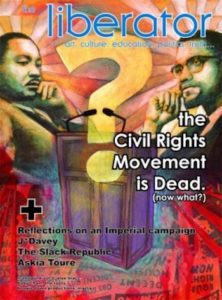
The first issue of The Liberator Magazine, a Black internet and print publication, was published on this date in 2002.
Its mission is to help preserve humanity by creating and supporting excellent spaces of dialog that provide fresh and forceful analysis and critique of art, culture, education, and politics. Founded by Brian Kasoro, Gayle Smaller, Tazz Hunter, Kenya McKnight, Marcus Harcus, and Mike Clark in Minneapolis, its first issue was published on July 21, 2002. As stated by Kasoro, the Liberator is a journal that has emerged from the urban enclaves of America. It is not just a magazine; it is a state of mind, one that is conscious of its potential to contribute to and help maintain life itself.
It provides an outlet for underexposed cultures, exposing artists worldwide while offering creative and functional analyses of mainstream culture to help build and maintain strong, culturally rich communities. It lends a voice to the voiceless and provides social and political analysis rooted in those same urban enclaves from which it has come. According to its stated principles, its content helps free minds from negativity, stress, and uncertainty.
It supports those engaged in artistic, cultural, educational, and political struggles for human rights and dignity. The Liberator is a collective, one of the conscious human beings--street observers, historians, journalists, poets, scientists, comedians, writers, philosophers, soap boxers, artists, and griots dedicated to ensuring that everyone's story, be it artistic, cultural or political, is told, heard, digested, analyzed and, most importantly, respected.
The Liberator has featured interviews with artists such as Chuck D, Saul Williams, and Talib Kweli, as well as articles on issues ranging from immigration to homelessness. The Liberator is a global publication, with a presence in Minneapolis, Washington D.C., New York, Atlanta, Chicago, Los Angeles, and Philadelphia, as well as in London, Nairobi, and Dakar.
Under its new name 'Live From Planet Earth,' The magazine continues African-based advocacy with environmental justice as a primary lens.